| Listing 1 - 9 of 9 |
Sort by
|
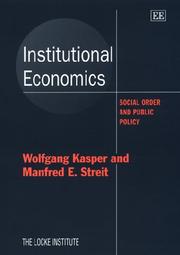
ISBN: 1858989418 9781858989419 Year: 1998 Publisher: Cheltenham Elgar
Abstract | Keywords | Export | Availability | Bookmark
 Loading...
Loading...Choose an application
- Reference Manager
- EndNote
- RefWorks (Direct export to RefWorks)
Microeconomics --- Methodology of economics --- Institutional economics. --- Institutional economics
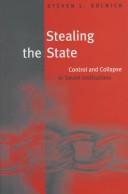
ISBN: 0674836804 Year: 1998 Publisher: Cambridge (Mass.) : Harvard university press,
Abstract | Keywords | Export | Availability | Bookmark
 Loading...
Loading...Choose an application
- Reference Manager
- EndNote
- RefWorks (Direct export to RefWorks)
Institutional economics --- Organizational change --- Perestroĭka. --- Political culture
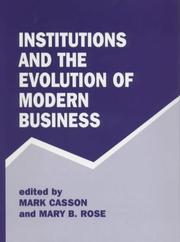
ISBN: 0714648450 0714644005 Year: 1998 Publisher: London ; Portland, OR : F. Cass,
Abstract | Keywords | Export | Availability | Bookmark
 Loading...
Loading...Choose an application
- Reference Manager
- EndNote
- RefWorks (Direct export to RefWorks)
Business enterprises --- Business enterprises --- Industrial organization --- Industrial organization --- Institutional economics --- History. --- History. --- History. --- History. --- History.
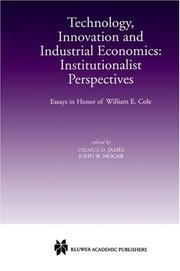
ISBN: 0792381912 Year: 1998 Publisher: Boston : Kluwer Academic Publishers,
Abstract | Keywords | Export | Availability | Bookmark
 Loading...
Loading...Choose an application
- Reference Manager
- EndNote
- RefWorks (Direct export to RefWorks)
Technological innovations --- Industrial organization (Economic theory) --- Institutional economics. --- Innovations --- Economie industrielle --- Institutionnalisme --- Economic aspects --- Aspect économique

ISBN: 0691034192 9786612753398 1400822521 1282753398 140081393X 9780691034195 9781400813933 9781282753396 6612753390 9781400822522 1400808839 Year: 1998 Publisher: Princeton, N.J. Princeton University Press
Abstract | Keywords | Export | Availability | Bookmark
 Loading...
Loading...Choose an application
- Reference Manager
- EndNote
- RefWorks (Direct export to RefWorks)
This book provides a surprising answer to two puzzling questions that relate to the very "soul" of the professional study of economics in the late twentieth century. How did the discipline of economics come to be dominated by an approach that is heavily dependent on mathematically derived models? And what happened to other approaches to the discipline that were considered to be scientifically viable less than fifty years ago? Between the two world wars there were two well-accepted schools of thought in economics: the "neoclassical," which emerged in the last third of the nineteenth century, and the "institutionalist," which started with the works of Veblen and Commons at the end of the same century. Although the contributions of the institutionalists are nearly forgotten now, Yuval Yonay shows that their legacy lingers in the study and practice of economics today. By reconsidering their impact and by analyzing the conflicts that arose between neoclassicists and institutionalists, Yonay brings to life a hidden chapter in the history of economics.The author is a sociologist of science who brings a unique perspective to economic history. By utilizing the actor-network approach of Bruno Latour and Michel Callon, he arrives at a deeper understanding of the nature of the changes that took place in the practice of economics. His analysis also illuminates a broader set of issues concerning the nature of scientific practice and the forces behind changes in scientific knowledge.
Economic schools --- anno 1940-1949 --- anno 1910-1919 --- United States --- Institutional economics --- Neoclassical school of economics --- Economics --- History --- Economics -- United States -- History -- 20th century. --- Institutional economics -- History -- 20th century. --- Neoclassical school of economics -- History -- 20th century. --- Business & Economics --- Economic Theory --- Cambridge school of economics --- Marshallian economics --- Classical school of economics --- Schools of economics --- Institutional economics - History - 20th century. --- Neoclassical school of economics - History - 20th century. --- Economics - United States - History - 20th century. --- United States of America
Periodical
Abstract | Keywords | Export | Availability | Bookmark
 Loading...
Loading...Choose an application
- Reference Manager
- EndNote
- RefWorks (Direct export to RefWorks)
Social sciences --- Political science --- Institutional economics --- Economics --- Sciences sociales --- Science politique --- Economics. --- Institutional economics. --- Political science. --- Social sciences. --- Economie. --- Institutionalisme. --- Wirtschaftstheorie --- Wirtschaftswissenschaft. --- Institutionalismus. --- Neue Institutionenökonomik. --- Public Choice. --- Theorie. --- Behavioral sciences --- Human sciences --- Sciences, Social --- Social science --- Social studies --- Civilization --- Civil government --- Commonwealth, The --- Government --- Political theory --- Political thought --- Politics --- Science, Political --- State, The --- Economic theory --- Political economy --- Economic man --- Ökonomische Theorie --- Volkswirtschaftstheorie --- Sozialökonomie --- Sozialökonomik --- Sozioökonomie --- Politische Ökonomie --- Volkswirtschaftslehre --- Theorie --- Periodicals --- Social policy --- Economic policy and planning (general) --- Social Sciences --- General and Others
Periodical
ISSN: 15082008 20826737 Year: 1998 Publisher: Lódz Lódz University Press
Abstract | Keywords | Export | Availability | Bookmark
 Loading...
Loading...Choose an application
- Reference Manager
- EndNote
- RefWorks (Direct export to RefWorks)
Economics --- Europe, Eastern --- Europe, Central --- Europe de l'Est --- Europe centrale --- Economic conditions --- Periodicals --- Conditions économiques --- Périodiques --- Volkswirtschaft. --- Wirtschaftspolitik. --- Wirtschaftswissenschaft. --- Theorie. --- Osteuropa. --- Polen. --- Welt. --- Economic history. --- 1900-2099 --- Europe, Central. --- Europe, Eastern. --- Business, Economy and Management --- Social Sciences --- Developmental Issues & Socioeconomic Studies --- Economy --- environmental economics --- labour economics --- international economics --- institutional economics --- financial economics --- History, Economic --- Central Europe --- East Europe --- Eastern Europe --- Central Europe. --- Eastern Europe. --- Eastern and Central Europe --- economy --- Volkswirtschaft --- Wirtschaftspolitik --- Wirtschaftswissenschaft --- Theorie --- Osteuropa --- Polen --- Welt
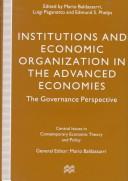
ISBN: 0333715756 Year: 1998 Publisher: Basingstoke Macmillan
Abstract | Keywords | Export | Availability | Bookmark
 Loading...
Loading...Choose an application
- Reference Manager
- EndNote
- RefWorks (Direct export to RefWorks)
AA / International- internationaal --- 331.31 --- 330.580 --- 330.48 --- Institutional economics --- Economic policy --- 338.9 --- Economic nationalism --- Economic planning --- National planning --- State planning --- Economics --- Planning --- National security --- Social policy --- Economisch beleid. --- Gecontroleerde economie. Geleide economie. Welvaarststaat. Algemeenheden. --- Neo-klassiekers en andere post-keynesiaanse theorieën. Public choice. Institutionalisten. Home economics. Analyseschool van de transactiekosten. --- Economic policy and planning (general) --- Economisch beleid --- Gecontroleerde economie. Geleide economie. Welvaarststaat. Algemeenheden --- Neo-klassiekers en andere post-keynesiaanse theorieën. Public choice. Institutionalisten. Home economics. Analyseschool van de transactiekosten
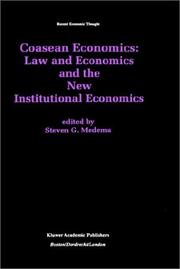
ISBN: 0792380347 9401062498 9401153507 Year: 1998 Volume: 60 Publisher: Dordrecht Kluwer Academic
Abstract | Keywords | Export | Availability | Bookmark
 Loading...
Loading...Choose an application
- Reference Manager
- EndNote
- RefWorks (Direct export to RefWorks)
Upon hearing that Ronald Coase had been awarded the Nobel Prize, a fellow economist's first response was to ask with whom Coase had shared the Prize. Whether this response was idiosyncratic or not, I do not know; I expect not. Part of this type of reaction can no doubt be explained by the fact that Coase has often been characterized as an economist who wrote only two significant or influential papers: "The Nature of the Firm" (1937) and "The Problem of Social Cost" (1960). And by typical professional standards of "significant" and "influential" (i. e. , widely read and cited), this perception embodies a great deal of truth, even subsequent to Coase's receipt of the Prize. This is not to say that there have not been other important works - "The Marginal Cost Controversy" (1946) and "The Lighthouse in Economics" (1974) come immediately to mind here - only that in a random sample of, say, one hundred economists, one would likely find few who could list a Coase bibliography beyond the two classic pieces noted above, in spite of Coase's significant publication record. ' The purpose of this collection is to assess the development of, tensions within, and prospects for Coasean Economics - those aspects of economic analysis that have evolved out of Coase's path-breaking work. Two major strands of research can be identified here: law and economics and the New Institutional Economics.
Externalities (Economics). --- Institutional economics. --- Law --- Right of property. --- Economic aspects. --- Coase, Ronald H. --- Economies externes --- Institutionnalisme --- Coase, R. H. --- Economic analysis of law --- Law of real property --- Externalities (Economics) --- Droit de propriété --- Droit --- Aspect économique --- Law and economics. --- Economic history. --- Public finance. --- Microeconomics. --- Law and Economics. --- History of Economic Thought/Methodology. --- Public Economics. --- Price theory --- Economics --- Cameralistics --- Public finance --- Public finances --- Currency question --- Economic conditions --- History, Economic --- Economics and jurisprudence --- Economics and law --- Jurisprudence and economics --- Jurisprudence --- Ownership of property --- Private ownership of property, Right of --- Private property, Right of --- Property, Right of --- Property rights --- Right of private ownership of property --- Right of private property --- Right of property --- Right to property --- Civil rights --- Property --- Costs, Social --- External economies and diseconomies --- External effects (Economics) --- Social costs --- Public goods --- Waste (Economics) --- Welfare economics --- Law and legislation
| Listing 1 - 9 of 9 |
Sort by
|

 Search
Search Feedback
Feedback About UniCat
About UniCat  Help
Help News
News